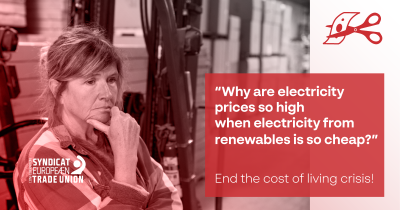The European Commission today proposed a revision of the EU’s internal electricity market design.
Commenting on the proposal, ETUC Confederal Secretary Ludovic Voet said:
“Working people have been badly let down by the EU’s privatised energy market, which has exacerbated the energy price crisis causing misery for millions this winter.
“A reform of EU energy policy which puts people’s right to clean and affordable energy before discredited liberalisation dogma from the 1980s is long overdue.
“Unfortunately, the changes proposed by the Commission today are purely cosmetic and don’t meet the scale of the energy crisis.
“The EU won’t meet the needs of its citizens, achieve climate neutrality by 2050 or develop strategic autonomy without a deep structural reform of its failing energy market.”
A real reform of the EU’s energy market should include the following changes:
PRICES: Revise the current price setting mechanism based on marginal pricing so that fossil fuel is no longer used as electricity price setter. This creates enormous windfall profits for energy producers and disincentivize the phasing-out of fossil fuels. As a short-term measure, we propose the implementation of the Iberian Price Cap.
SPECULATION: Speculation on financial markets also contributes to volatility and price hikes without necessarily reflecting fundamental supply and demand factors. The ETUC believes that there should be more ambitious regulations to control those financial markets and prevent speculation.
HUMAN RIGHT: The EU should ensure that access to affordable energy is considered as a human right, and its transport and distribution infrastructure, are considered as common good and not as a market commodity.
AFFORDABLE ENERGY: The EU should investigate the possibility of ensuring a minimum floor of energy supply for citizens which would benefit low and middle-income households and to tenants, in order to eliminate energy poverty. Member States can also regulate tariffs to this end.
PREDICTABILITY AND SUPPORT TO COMPANIES : To support transparency and predictability for companies to be protected against price variations, it should be mandatory for suppliers to offer the opportunity to opt for fixed long term energy contracts, which is currently not the case. Additional support aimed primarily at SMEs and enterprises in difficulty can also be designed to protect jobs, with environmental and social conditionalities, to speed up energy efficiency, energy savings and energy self-production measures.
DISCONNECTIONS: Articles 28 and 29 of the 2019/944 Directive dealing respectively with vulnerable consumers and energy poverty, should be revised to introduce a permanent ban of disconnections and to step up the fight against energy poverty.

